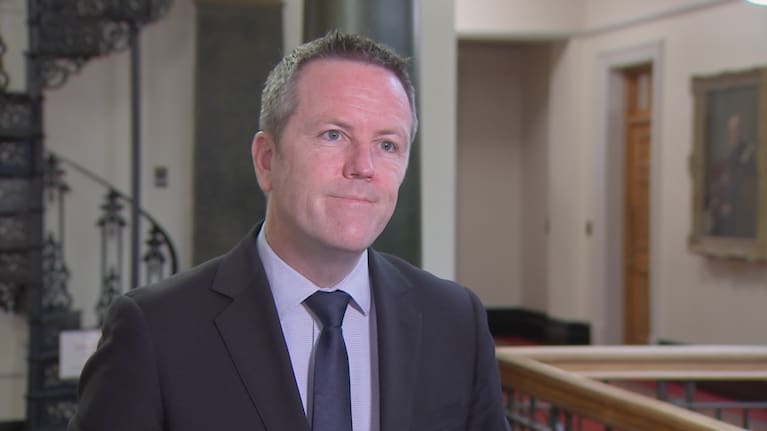Dewi Preece looks at the electorate of Tāmaki and dives into data from Vote Compass to see if it gives any hints as to how a tightly fought contest between right-wing frenemies could go.
There's a few things you should know about Tāmaki.
Since its inception in 1946, the electorate's been held by the National Party for all but two terms, and was the seat of former Prime Minister Robert Muldoon for 31 years.
It's also been held by incumbent Simon O'Connor since 2011, who retained the seat in 2020 with a 52.7% share of the vote - a significant hold in the face of a nationwide red wave.
And yet, it's the seat that's being targeted by National's potential coalition partner, ACT.
Not just a half-hearted attempt to flip the seat, but rather rolling out the big guns with deputy leader Brooke Van Velden.
For political scientist Lara Greaves, it's one of the most intriguing seats to watch this election.
"Brooke van Velden is challenging Simon O'Connor there on the basis that Simon O'Connor's quite conservative," she said.
Davis thinks van Velden is the first "viable candidate from any other party who’s put their hand up" in a long while, and said she's put in a huge effort this campaign.
"[She's been] very visible, gone back to the kind of thing that used to be street corner meetings, right throughout the electorate," he said.

2018 census data shows Tāmaki as being made up of 70% people with European backgrounds, with 43% of the electorate affiliated with Christianity, the fifth-highest among electorates nationwide.
While ACT and National are singing from many of the same song sheets, Van Velden is promoting herself as a more liberal option for the people of Tāmaki.
"It's kind of strange, does ACT have some data that we don't have, and that's why they're contesting it?" asks Greaves.
In the absence of any ACT data, can online election tool Vote Compass come up with any answers?
Tāmaki actually ranks as the country's 22nd most right-leaning electorate, while Papakura topped that list.
However, it is among the electorates which saw the biggest ideological shift to the right - or further right in this case - since the 2020 election.
The electorate which shifted furthest right between 2020 and 2023 was Epsom. That's the only electorate seat ACT has won since 2014, and the neighbouring electorate to the west of Tāmaki.
Vote Compass also shows Tāmaki rank as the country's sixth most conservative electorate - which again begs the question, on what grounds does ACT think it can chip away at one of National's traditionally safest seats?
The answer may lie in a deeper dive through Vote Compass data.
For example, on issues like legalising cannabis, 53% of those who completed the Vote Compass survey either strongly or somewhat agreed that the drug should be legalised. Tāmaki was close to that average with 50%.
On issues such as whether transgender women should be allowed to compete in women's sports leagues, 53% of the New Zealand population strongly disagreed, while in Tāmaki that figure was slightly lower (50%).
Despite being held by a conservative incumbent for more than a decade in National's O'Connor, local board member Davis doesn't think the electorate itself is particularly conservative on social issues.
"What has come up [in general conversations around town] is that a lot of people don’t share the same social views," he said.
The electorate was broadly more supportive than the national average on issues relating to climate change, but when it comes to tax and economic issues Tāmaki was consistently further right than the national average.
So fiscally right, relatively conservative, where does ACT think it can get cut-through?
Data would suggest on co-governance and Māori issues.
Tāmaki was above the national average when it came to opposing prioritising Māori and Pasifika patients for medical procedures, on how much of a role the Treaty of Waitangi should have in New Zealand law, and whether the government should formally change the name of New Zealand to Aotearoa.
A Taxpayers’ Union – Curia poll from earlier this month had Van Velden and O'Connor split by just 2%, a slim margin that both candidates will see as a path to parliament.
Whether it's enough of a foothold to flip an electorate, will be revealed tomorrow night when the election results come in.
Vote Compass
Developed by a team of social and statistical scientists from Vox Pop Labs, Vote Compass is a civic engagement application offered in New Zealand exclusively by 1 News/TVNZ. The findings are based on 2,171 respondents who participated in Vote Compass from September 10 to October 11, 2023.
Unlike online opinion polls, respondents to Vote Compass are not pre-selected. Similar to opinion polls, however, the data are a non-random sample from the population and have been weighted in order to approximate a representative sample. The Vote Compass sample data have been weighted by gender, age, education, income, region, Māori ancestry, and partisanship to ensure the overall composition reflects that of the actual population of New Zealand according to census data and other population estimates.



















SHARE ME